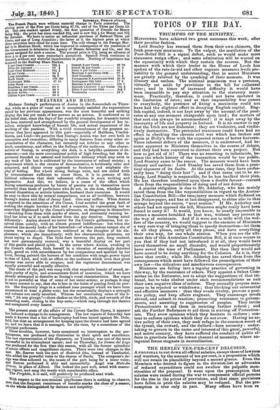TOPICS OF THE DAY.
TRIUMPHS OF THE MINISTRY :,w MINISTERS have achieved two great successes this week, after their peculiar fashion.
Lord Stanley has rescued them from their own chimera, the Irish poor-rate maximum. To the vulgar, the mutilation of the Poor-Relief Bill is a signal defeat, such as would make most statesmen resign office ; and some admiration will be wasted on the equanimity with which they sustain the reverse. But the manner with which their leader in the House of Lords has spoken of the rate-in-aid and other cognate measures lends pro- bability to the general understanding, that in secret Ministers are greatly relieved by the quashing of their measure. It was illusory and useless. The nominal ma,ximurn was a pretence, virtually set aside by provisions in the bill for collateral rates; and in times of increased difficulty it would have been impossible to pay any attention to the statutory maxi- mum. Practically, therefore, it could not have operated in the limitation of rates ; and as that impossibility was patent to everybody, the pretence of fixing a maximum could • not have had the slightest effect in decoying English capital. Eng- lish capital, indeed, is not kept away by the amount of the poor- rates-at any one moment chargeable upon land ; for matters of that sort can always be accommodated : it is kept away by the insecurity of life and property in Ireland. It is no answer to say that the Irish are not dishonest : they are vindictive; and vindic- tively destructive. The pretended maximum could have had no effect in checking the chronic civil war which has broken out again at Dolly's Brae with the expected return of better harvests. These inherent defects of the measure, it is understood, had be- come apparent to Ministers themselves in the course of debate, and they had been converted to distrust their own project. But bow to get rid of 'it? There was no resorting to infanticide, be- cause the whole history of the transaction would be-too public. Lord Stanley came to the rescue. The measure would have been illusory and useless : Lord Stanley has saved them froth a praC- tical exposure of its faults. At the same time, they have profes- sedly been " doing their best " ; and if that turns out'to be no- thing, Lord Stanley is responsible, for he has baulked their plan. He has therefore conferred upon them a double favour—rescued them from the responsibilities of doing and of not doing.
A similar obligation is due to Mr. Adderley, who has mainly saved them from the like responsibilities in regard to the Austra- lian Constitution Bill—the imaginary measure whiCh flickered on the Notice-paper, and has at last disappeared, to shine afar in that mirage beyond the recess, "next session." If Mr. Adderley and others had not opposed the bill, Ministers might really'have been forced to carry it I It would, you know, be nearly impossible to retract a measure heralded as that was, without any pretext in the way of resistance. And if it were not to trifle with the wel- fare of the country, we would suggest to the enemies of Ministeirs a very sure way of bringing them to speedy destruction—let them do all they please, carry all they please, and have everything their own way, for one whole session. When you see the ulti- mate fate of this Australian Constitution Bill, it at once occurs to you that if they had not introduced it at all, they would have saved themselves no small discredit, and would proportionately have saved the time of Parliament. But then they would not have seemed to be doing anything for the Colonies. As it is, they have that credit; while Mr. Adderley has saved them from the consequences which must have followed the promulgation 'of their own law—the ridiculous and mischievous consequences..
Ministers are falling into a regular practice of governing in this way, by the resistance of others. They appoint a Select Coin- mittee on the Estimates, not to adopt the suggestions of that tri- bunal, but to take shelter under such recommendations as suit their own negative ideas of reform. They annually propose Mea- sures to be rejected or withdrawn ; thus blocking out substantial and effective measures : thus they evade rivalry, prevent a posi- tive policy, and keep affairs stagnant. They encourage revolt abroad, and submit to reaction; promoting resistance' to govern- ments, and assenting to suppression of peoples. They invite Protectionists to aid them in resisting further reform ; and ask the Further Reformers to aid them in staving off Protection- ists. They avow opinions which they hesitate to enforce ; con- tent to enforce opinions which they do not avow. Having no ac- tive policy of their own, they seek refuge in the common resort of the tyrant, the coward, and the dullard—bare necessity : under- taking to govern in the name and interest of this great, powerful, and active country, they have suffered the conduct of public af- fairs to gravitate into the lowest channel of necessity, where an- tagonist forces stagnate in neutralization.


























 Previous page
Previous page